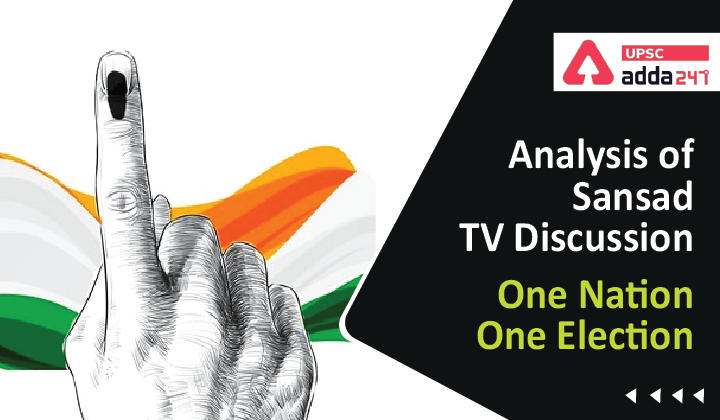Table of Contents
Analysis Of Sansad TV Discussion: ”One Nation, One Election”
Relevance
GS 2: Representation of People’s Act
Context
- Chief Election Commissioner Sushil Chandra said recently that the Election Commission is fully prepared and is capable of conducting simultaneous elections.
- He also asserted that since Independence, for several years, simultaneous elections were held. It was only after 1967 that some Assemblies were dissolved, on some occasions the Lok Sabha, disturbed the schedule.
Background
- One Nation, One Election is an idea which is not new to India, because from 1951-52 till about 1967, we did have simultaneous Lok Sabha and Assembly elections, but it has become a subject matter of debate in recent years.
- Prime Minister Narendra Modi has often spoken about the need to hold simultaneous elections in the country as continuous polls in some or the other part of the country hampers development.
What has been done on this issue yet?
- There have been substantial discussions in the country with numerous views on the subject, but no substantive move owing to several impediments – constitutional, legal and of course political.
- So the question now is – When the idea is not new, what is causing a challenge towards implementation of the One Nation One Election.
- In 2015, the Parliamentary Standing Committee on Personnel, Public Grievances, Law and Justice, headed by E M Sudarsana Natchiappan, prepared a report on the ‘Feasibility of Holding Simultaneous Elections to House of People (Lok Sabha) and State Legislative Assemblies’.
- Election Commission repeatedly said on this issue that simultaneous elections were “a very desirable goal, but for that, political systems of the country will have to take steps to align the life of a state Assembly with the life of Parliament”.
What did Law Commission recommend for simultaneous elections?
- The Law Commission of India (Chair: Justice B.S. Chauhan) released its draft report on Simultaneous Elections on August 30, 2018.
- The report examined legal and constitutional questions related to the conduct of simultaneous elections.
- Key draft recommendations include:
Conduct of simultaneous elections
- The Commission noted that simultaneous elections cannot be held within the existing framework of the Constitution.
- Simultaneous elections may be conducted to Lok Sabha and state Legislative Assemblies through appropriate amendments to the Constitution, the Representation of the People Act 1951, and the Rules of Procedure of Lok Sabha and state Assemblies.
- The Commission also suggested that at least 50% of the states should ratify the constitutional amendments.
Key Benefits
- The Commission noted that holding simultaneous elections will: (i) save public money, (ii) reduce burden on the administrative setup and security forces, (iii) ensure timely implementation of government policies, and (iv) ensure that the administrative machinery is engaged in development activities rather than electioneering.
Framework for synchronisation of elections
- The Commission recommended three alternatives to synchronise elections in India.
- The Commission recommended advancing or postponing election timings in certain states, such that elections to all state assemblies and Lok Sabha may be held together in a year.
- Assembly elections due before Lok Sabha elections should be held together.
- Assembly elections due immediately after Lok Sabha elections should be held together.
- Thereafter, elections to Lok Sabha and state assemblies may be held together from 2024.
- This will require a constitutional amendment since the terms of different assemblies will either need to be curtailed or extended.
- If simultaneous elections cannot be conducted, then the Commission recommended that all elections falling due in a calendar year should be conducted together. The timing of such election should be conducive to all state legislatures involved and the Lok Sabha (if dissolved earlier). This option will also require amendments to the Constitution and the Representation of the People Act, 1951.
No-confidence motion
- The Commission noted that a no-confidence motion if passed may curtail the term of Lok Sabha/ state assembly.
- It recommended replacing the ‘no-confidence motion’ with a ‘constructive vote of no-confidence, through appropriate amendments.
- In a constructive vote of no confidence, the government may only be removed if there is confidence in an alternate government.
- It further suggested the option of limiting the number of such motions during the term of the House/ Assembly.
Hung House/ Assembly
- If no party secures a majority to form the government, it may result in a hung House/ Assembly.
- In order to prevent this, the Commission recommended that the President/ Governor should give an opportunity to the largest party along with their pre or post-poll alliance to form the government.
- If the government can still not be formed, an all-party meeting may be called to resolve the stalemate.
- If this fails, mid-term elections may be held.
- The Commission recommended that appropriate amendments be made to provide that any new Lok Sabha/Assembly formed after mid-term elections, will be constituted only for the remainder of the previous term, and not the entire five years.
Amendment to anti-defection laws
- The Commission recommended that appropriate amendments be made to anti-defection laws to ensure that all disqualification issues (arising from defection) are decided by the presiding officer within six months.
Conclusion
Although there are arguments for both seeking and opposing simultaneous elections to Lok Sabha and all State Assemblies across India. But, no one can deny the fact that frequent elections are costing a lot to our country in many aspects and there is no doubt that ”One Nation, One Election” would reduce the cost of holding elections, and limit all elections to a single season.



 TSPSC Group 1 Question Paper 2024, Downl...
TSPSC Group 1 Question Paper 2024, Downl...
 TSPSC Group 1 Answer key 2024 Out, Downl...
TSPSC Group 1 Answer key 2024 Out, Downl...
 UPSC Prelims 2024 Question Paper, Downlo...
UPSC Prelims 2024 Question Paper, Downlo...




